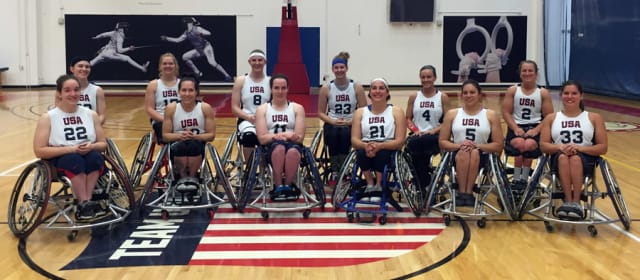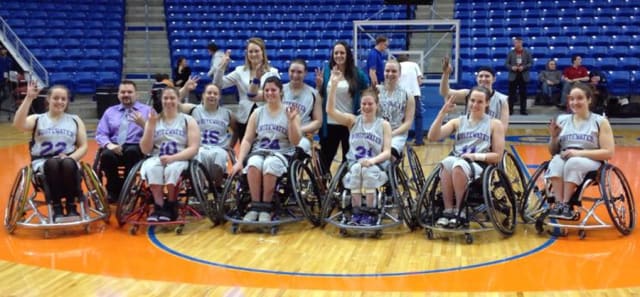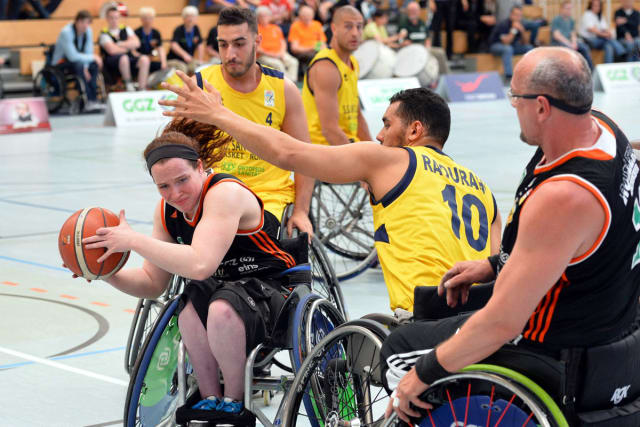No bull; Vanessa Erskine is about to be a Paralympian
CHARLOTTE (Steve Goldberg's Wheel World) - Just about a week before it was officially announced, I learned that USA coach Stephanie Wheeler had come around to adding a 12th player to her roster for Rio.
CHARLOTTE (Steve Goldberg's Wheel World) - Just about a week before it was officially announced on Thursday, I learned that USA national women's team coach Stephanie Wheeler had come around to adding a 12th and final player to her roster for the Rio Paralympic Games.
"It's one of those things you dream of doing and now you're getting to do it," says Vanessa Erskine.
Dropped in a cut last year, she rejoined the team prior to a Rio run-up tournament the USA was hosting earlier this week in Colorado Springs with the squads of Brazil, Canada, and China.
 The USA Women's Paralympic Wheelchair Basketball Team for Rio 2016. Vanessa Erskine is number 11 in front row. Photo courtesy of NWBA
The USA Women's Paralympic Wheelchair Basketball Team for Rio 2016. Vanessa Erskine is number 11 in front row. Photo courtesy of NWBA
To be honest, though she was on a top women's team in college, I was not familiar with the name or resume of Vanessa Erskine so I started googling, binging, yahooing… ya know, doing whatever the kids are calling research these days.
I was intrigued to find that this person I had never heard of was playing professionally on a men's team in Germany, that she had two NWBA collegiate titles to brag about; that she played for the USA in Argentina at the 2013 Youth Parapan American Games in 3x3 wheelchair basketball; and that she had barely taken up the sport around the time of the last Paralympic games.
"I'm only 17," she wrote on September 7, 2011 in a blog called My Perfectly Imperfect Life. "There's no way I'm letting a wheelchair stop me from anything."
That wheelchair certainly didn't stop her. Though I could tell from talking to her Wednesday evening that she was going to conquer the world regardless, that wheelchair has only made her go faster.
The blog continued: "I play wheelchair basketball, participate in road races, go to the gym and participate in ZUMBA classes, and go to my local rehab center to ride the FES bike and lift weights."
And I haven't even gotten to the really impressive part yet.
As a junior in high school, Vanessa decided that an interesting part-time job would be working as a bullfighter. Not the Spanish type with the funny hats, tight pants, and red capes but the American style who are kind of like the lifeguards of rodeo bucking bull riding events.
They are the brave ones who come to the rescue when the cowboy gets separated from the bull. They are actually more bull distractors than bull fighters. Who wants to fight a disgruntled animal with horns that weighs at least a hundred times more than you do?
Erskine had been in the ring for about six months, working her way up to bigger events and bigger bulls.
April 30, 2011. After a rider had been bucked, the bull was reticent to exit the ring. While Vanessa and two other bullfighters were focused on getting the bovine out, someone decided that letting a second bull into the ring might influence the other to go.
The second bull immediately charged the bullfighters, caught Erskine with its foot long horns and tossed her a reported 20 to 30 feet in the air. She landed on her head and the bull evidently never heard about not kicking a person when they're down.
Bull 1 - Erskine 0
A T4 complete paraplegic, this pending paragon of positivity sprang from her hospital bed months before the doctors wanted her to and was well into figuring out what she could do while others worried about what she couldn't.
Just turning 22 next month, Erskine's ascension to the Paralympic team comes though she's only been playing basketball for less than five years. Not just wheelchair basketball but basketball in general.
"Before my accident I was a cheerleader, gymnast, runner, weight lifter, diver, swimmer, pole vaulter," she wrote in that blog. I just checked it again. No mention of basketball.
She was only several months into playing with the KC Pioneers junior wheelchair team when she was recruited by the University of Wisconsin-Whitewater, which at the time was becoming the dominant collegiate women's team in the NWBA.
Bull 1 - Erskine 1.
There she not only learned from head coach Dan Price, who left after this season to take over Great Britain's U-25 women, but also the likes of USA national teamers Becca Murray and Desi Miller, Germany's Mareike Adermann, and the Netherland's Mariska Beijer, all standout players at the 2012 London Paralympic Games. That quartet was the core of three straight championships for Whitewater from 2012 to 2014 and Erskine was on two of them.
 The 2014 NWBA Intercollegiate Champions. Vanessa Erskine is 2nd from right in front row. Photo courtesy of University of Wisconsin-Whitewater
The 2014 NWBA Intercollegiate Champions. Vanessa Erskine is 2nd from right in front row. Photo courtesy of University of Wisconsin-Whitewater
Finishing college with honors a year ahead of schedule, she was then recruited to play at German professional side BSC Rollers Zwickau. Her boyfriend Ben Kenyon, a former UWW player, was already there. She is a nominee for the Young Player of the Season award in Rollt Magazine's fan vote.
Bull 1 - Erskine 2.
Being a female 1.0 classification makes Erskine a unicorn of sorts. A solid 1.0 is a benefit to any team but in the German professional league, there's the added bonus of a one and a half point deduction for female players, so there she is technically a negative .5 which allows for maximizing higher classified players on the floor. Whether that's sexist or equalizing is not to be argued here. The fact is that it gives Erskine some clout, something that will only get stronger as she continues to improve.
 BSC Rollers Zwickau's Vanessa Erskine looks to create against Italian club Santa Lucia of Rome in the 2016 IWBF Europe Champions Cup. Photo courtesy of Harzer-Pressefoto
BSC Rollers Zwickau's Vanessa Erskine looks to create against Italian club Santa Lucia of Rome in the 2016 IWBF Europe Champions Cup. Photo courtesy of Harzer-Pressefoto
In Germany, that comes from playing predominantly against faster, stronger men who respect her by - How shall I put this? – not respecting her.
They treat me as a player. They don't go easy on me by any means because I'm a girl. Even in practice they don't. My own team will beat me up. - Erskine
In Rio, she'll play behind two-time Paralympian Darlene Hunter and Mackenzie Soldan, a first-time basketball Paralympian who played tennis for the USA in London.
"What better way for her to learn," says Wheeler.
While her on-court Paralympic peak may be down the road in 2020, Wheeler says there is much Erskine will contribute now.
"Vanessa's a phenomenal teammate," says Wheeler who played that role herself on her first Paralympic team in 2004. "She has something inside of her. Nothing is going to hold her back."
Wheeler is spot on with that. I didn't know of her before but now that I've had the chance to talk with Vanessa, I will never forget her.
Paralyzed at 16; a professional basketball player on the way to the Paralympics at 21.
Bull 1 - Erskine 3; game over.
Steve Goldberg
FIBA
FIBA's columnists write on a wide range of topics relating to basketball that are of interest to them. The opinions they express are their own and in no way reflect those of FIBA.
FIBA takes no responsibility and gives no guarantees, warranties or representations, implied or otherwise, for the content or accuracy of the content and opinion expressed in the above article.
To help make this column as inclusive as possible, please send any national or international event information, story suggestions, or comments to wheelworldmail@gmail.com.